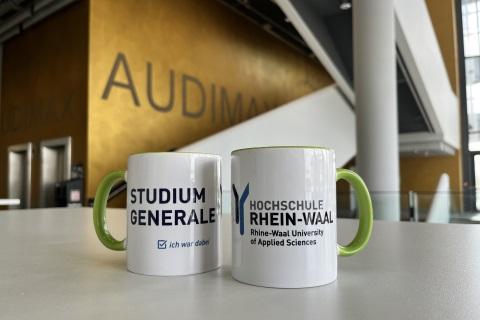Studium Generale
Think Globally – Act Locally
We cordially invite you to join us for Studium Generale! This semester's motto is ‘Think globally – act locally’. Learn about regional projects and scientific work by our employees that can have a global impact.
The established Studium Generale series offers exciting insights into current research, social challenges and forward-looking developments – presented in an accessible way and open to all interested parties. Whether it's your first time in a lecture hall or a return to your student days, we look forward to seeing you there!
All events are held in german.

Programm 2025/2026
25 November 2025; 6 p.m. Audimax, Kleve Campus
‘Changing the world step by step: studying and working at Rhine-Waal University of Applied Sciences’
The HSRW is a unique place of education; it stands for intercultural education, cross-border cooperation and sustainable education. Students from all over the world acquire knowledge and skills here, contribute to alleviating the shortage of skilled workers after graduation and bring new perspectives to companies. When they return abroad, they act as ambassadors for Germany. We present the perspectives, projects and personalities of the HSRW.
Format: Lecture
Prof. Dr Oliver Serfling (Professor specialising in economic policy and development economics)
Imke Hans (Career Service and Employability / Transfer Manager for Capacity Building in the Region)
---postponed indefinitely---09.12.2025; 6 p.m. Lecture hall 6 in the Audimax, second floor, Kleve campus
‘Is sustainable travel possible or is it an illusion created by the tourism industry?’
Despite a brief interruption due to the coronavirus pandemic, travel remains a very popular activity in Germany. However, discussions in recent years, whether about tourism's contribution to climate change or overtourism, have influenced travel and how it is perceived. The concept of sustainable tourism has become increasingly important. This lecture will look at what the tourism industry, travellers and political decision-makers can do to enable and perceive more sustainable travel.
Format: Lecture
Prof. Dr Dirk Reiser (professor specialising in sustainable tourism management)
13 January 2026; 7 p.m. Hörsaal 6 (01 02 05), Kleve Campus
‘Universities as democratic spaces? Research findings on social democratic participation as a dimension of academic success’
The Federal Higher Education Framework Act („Hochschulrahmengesetz“) has required (West) German universities since 1976 to enable their students "to act responsibly in a free, democratic, and social constitutional state." A similar, democratically oriented educational mandate can be found in the regulations for the accreditation of degree programs. The talk introduces current empirical findings from the BMBF-funded research project "GesDimS – Societal-Democratic Engagement as a Dimension of Student Success" regarding the implementation of these requirements. Thereby universities are primarily examined in terms of their quality management, but also as organizations and from the perspective of students. Building on this, the talk explores the university as a democratic space and invites discussion on the topic.
The lecture will be held in German, with whispered translation into English provided on the spot. Questions for discussion may be asked in German or English.”
Also available online: https://hsrw.webex.com/hsrw/j.php?MTID=m5c68eb9efa6b0995299c7b6796a5eac9
Format: Lecture & discussion panel
PD Dr Britta Behm (Research assistant and project manager at the Institute for Higher Education Research at Martin Luther University Halle-Wittenberg)
Prof. Dr Eva Maria Hinterhuber (Rhine-Waal University of Applied Sciences (moderator))
27 January 2026; 6.30 p.m. Audimax, Kamp-Lintfort Campus
‘Digital angels or cold helpers?’ Opportunities and limitations of AI in care, education, participation and disability support – between relief, responsibility and ethics.’
Artificial intelligence is changing our everyday lives – including in care, education and disability support. But how is it changing the way we support people with disabilities or care needs? And what does this mean for institutions that provide assistance today? In this panel discussion, we will examine two perspectives: how AI can directly help people in need of support – and how it is changing the organisations that provide assistance today. Together with experts from the fields of care, education, technology and disability support, we will discuss the opportunities, limitations and ethical issues of this digital development. We also want to shed light on current research topics and discuss the direction they are taking.
Format: Panel discussion
Monika Hoolmann, Fachbereichsleiterin Inklusion der Lebenshilfe im Kreis Kleve e.V.
Dirk Unsenos, Geschäftsführer der ISIS IC Gmbh
Prof. Dr. Edwin Naroska, Professor für Technische Informatik, Hochschule Niederrhein
Prof. Dr. Christian Ressel (professor specialising in ambient intelligent systems, Hochschule Rhein-Waal)
Prof. Dr. Nele Wild-Wall, Professorin für psychologische Methodenlehre, Neuro- und Gerontopsychologie, Hochschule Rhein-Waal
Birgit Mosler (innovation and network manager at the projekt ZAT Rhein-Ruhr, Hochschule Rhein-Waal)
If you have any feedback or questions feel free to contact innovation@hochschule-rhein-waal.de. We look forward to your participation.
Contact
Centre for Research, Innovation and Transfer
Florian Gaisrucker
innovation@hochschule-rhein-waal.de
